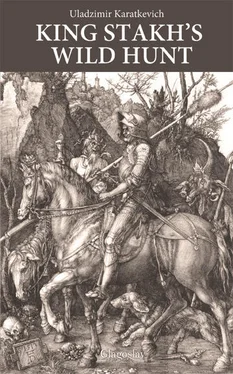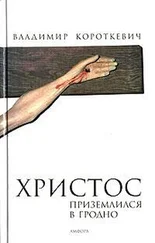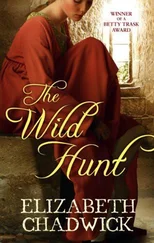What Raman had planned was black treachery. Wouldn't God have blessed King Stach's reign if he had seized the throne of his ancestors, even though he was a mužyk king, even though he had rebelled against the lording sovereigns?
King Stach arrived at Marsh Firs, and in his honour the castle was decorated with lights and feasting began. And he drank and made merry with the landowner, Raman, and the other landowners, and of these gentlemen there were, perhaps, a hundred and thirty. And at night they rode off on the hunt, since the nights were bright, and on such nights the marsh lynx leaves its bushy haunts and walks about the plain from Marsh Firs to the Kurhany and Pniuchi groves and catches not only cattle but also solitary wayfarers.
And that is why everybody hates the marsh lynx and kills it. The wolf will pass by, and the forest lynx will more often turn away, while the marsh lynx does not — he is a man-eater.
And so all the guests left, and Raman left to hunt the marsh lynx together with the King's hunt and his faithful old friend, Alachno Varona, his beater-in, and with Dubatoŭk of the petty Polish gentry. And the night turned out to be one in which the moon barely shone and hardly anything was visible, and although it was autumn, blue marsh lights were skipping about in the swamps.
And people extinguished the lights in their dwellings, and, perhaps, even God, moved by his indescribable wisdom, extinguished the lights in some human souls, too. And Raman and King Stach lagged behind their beaters-in.
They had hardly taken a look around, when a marsh lynx sprang out from the bushes, knocked down Raman's horse, and tore out a piece of the horse's stomach together with his intestines, for such is this animal's habit. And Raman fell, and he felt mortal terror, for the animal, that was wider and longer than himself, looked at him with fiery eyes.
At this moment Stach jumped down from his daredevil horse straight onto the animal's back, grabbed it by the ear, tore its snout from Raman, who was lying on the ground, and with his short sword slashed at its throat. The lynx shook Stach off with its paw and pounced hard on him, but at this moment Raman jumped down and broke the skull of the man-eater with his fighting calk. And so the three of them lay there, and Raman helped the King to stand up, and said:
“We are quits, my friend. You saved my life, and I your heart.”
And then the hunters met them and decided to spend the night in the forest and drink again and make merry, for their souls and their hearts had not yet had enough food and drink after the struggle with the lynx, and they asked for wine. They made a camp-fire in the forest and began to drink. It was so dark when the moon disappeared, that on making a step from the fire you could not see the fingers on your hand. They took the barrel of wine that Raman had brought and they drank and made merry. Nobody knew that the wine was poisoned, except Raman, Varona and Dubatoŭk, who had beforehand accustomed themselves to this poison.
Everybody drank, only King Stach drank little.
Just a moment, Raman. What are you doing, Raman? This man wanted to give up his life for his country. Do you then wish to exchange God's plans for your own? You regret your supremacy, but have you thought that the will of your people is being trampled on, that their language and faith and their souls are being trampled on? You are not thinking of this, your heart is filled with envy and pride.
And they continued drinking until King Stach's hunters could hardly keep their eyes open. But the King kept on talking, saying how happy he would make everybody when he took his seat on the throne of his forefathers.
And then the Polish landowner, Raman, took his lunge, holding it by the handle with both hands, come up to King Stach from behind, threw the lunge over his head, and lowered the lunge with its sharp end onto the back of King Stach's head. The drowsy King lifted his head, looked into Raman's eyes, and his face running with blood was like a terrible wail to God for vengeance.
“But what have you done? We are brothers, aren't we?” And attempting to rise, he shouted:
“Why have you sold your people, apostate? You have deprived many people of their happiness now.”
Raman struck him with his sword a second time, and Stach fell, but he had not yet lost the gift of speech:
“Now beware, you traitor! My curse on you and your evil kin! May the bread in your mouth turn to stone, may your wives remain childless, and your husbands choke in their own blood!”
And then, his voice weakening, he said cruelly:
“You've betrayed your land, my former brother! But we shall not die. We'll yet come to you and to your children, and to their heirs, my hunters and I. Unto the twelfth generation will we take revenge ruthlessly, nor shall you hide from us. You hear? Unto the twelfth generation! And each generation shall tremble with greater pain and more terribly than I now at your feet.”
And he dropped his head. And his hunters dumb until now, at last came to, and snatched up their knives. And they fought twenty against three, and the battle was a fearful one. But the three conquered the twenty and killed them.
And afterwards they strapped the corpses and the wounded, who were pitifully groaning, to their saddles and drove off the horses, and the horses hastened off in a straight line to the Giant's Gap.
But nobody had noticed that there was a spark of life yet in King Stach's body. The horses flew on into the night, and a faint moon lit up their long manes, and somewhere ahead of them blue lights skipped about among the mounds.
And from this wild herd came King Stach's voice:
“To the devil with my soul, if God doesn't help. Hold Raman! Our horsemen are coming at a gallop to you! Tremble, Raman, and shiver, our eternal enemy. We shall come! We shall avenge!”
And nobody knew that these words were true words, that King Stach had become a weapon in the hands of the devil for revenge and punishment. No murder whatever deserves such vengeance as fratricide.
Not long was their stay on this earth. The beater-in, Varona, was the first to see the ghosts of Stach and his followers within two weeks. The Wild Hunt raced on heedlessly, onward it flew across the most terrible quagmire, across the forest, across the rivers.
No tinkling of bits, no ringing of swords. Silent were the horsemen on their horses, and ahead of the phantom King Stach's Wild Hunt were the swamp lights skipping across the quagmire.
Varona went mad. And Dubatoŭk perished afterwards. The Lithuanian hetman dispersed peasant armies who were left without a leader; Jaraš Štamiet was killed in battle. But Raman Janoŭski was alive and laughed.
But once after hunting, he was returning home alone through the heather wasteland, the moon hardly lighting the way for him. Suddenly from somewhere behind him the marsh lights came skipping. And the sound of bugles reached him, and the stamping of hoofs which was heard but faintly. Later, vague apparitions of horsemen were seen. The horses' manes waved with the wind, an unleashed cheetah ran ahead of the phantom Wild Hunt. And noiseless was their flight across the heather and the quagmire. And silent were the horsemen, while the hunting sounds came flying from somewhere on the other side. And ahead of all, dimly lit by the moon, galloped the enormous King Stach. And brightly burned the eyes of the horses, the people and the cheetah.
And Raman raced on, and they silently and quickly flew after him; the horses sometimes pawed the ground in their flight, and the wild heather sang, and the moon looked at the chase with indifference.
And Raman did thrice shout: “The Wild Hunt!” So loud his voice that he was heard by people even in distant huts. And then the Wild Hunt caught up with him, and his heart failed him. That is how Raman perished.
Читать дальше



